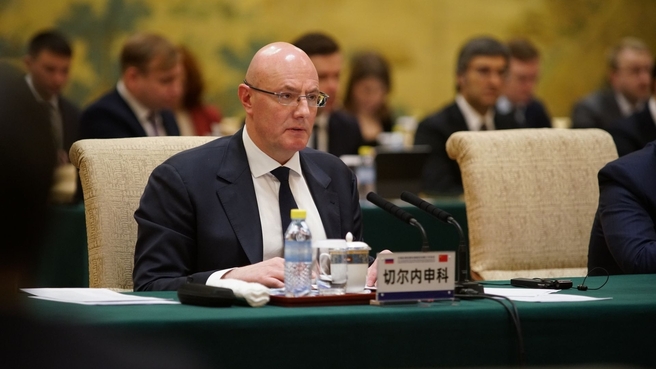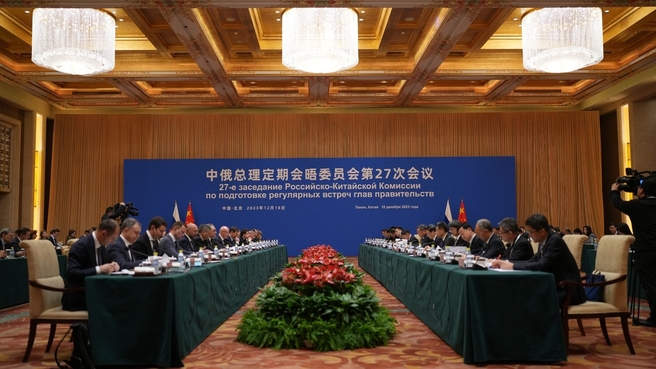Deputy Prime Minister of the Russian Federation Dmitry Chernyshenko and Vice-Premier of the State Council of China He Lifeng co-chaired the 27th session of the Russia-China commission on preparing for regular prime minister meetings in Beijing. They discussed the agenda of the 28th regular meeting of Russian Prime Minister Mikhail Mishustin and Premier of the State Council of China Li Qiang. The agenda is focused on digital and high technology.
Dmitry Chernyshenko thanked his Chinese counterpart for the warm reception of the Russian delegation in Beijing and noted that today relations between Russia and China have reached their highest level in history.
“The strengthening of our comprehensive, equitable and trust-based partnership and strategic interaction with friendly China is a Russian foreign policy priority. I must emphasise that our countries are dynamically developing their relations. This year, Russian-Chinese trade increased by 26.7 percent. Over the first 11 months of this year, it has exceeded $201 billion. According to the Main Customs Department of China, our trade has already reached $218 billion. This is already more than the $200 billion set for us by President of Russia Vladimir Putin and President of China Xi Jinping. Thus, Russia is becoming China’s fourth largest trade partner, and we can say with confidence that if we maintain this pace, we can well reach the $200 billion milestone,” emphasised Mr Chernyshenko.
“The leaders of our countries have set many goals in developing cooperation and our commission is playing a key role in this. Our goal is to prepare for the 28th prime minister meeting. Russia and China are productively developing their cooperation despite the external challenges. Now we must raise it to an even higher level,” said Mr He Lifeng. He also noted the unprecedented level of trade, the appearance of new types of products from the agro-industrial sector in the Chinese market and the steady growth of oil, gas and raw materials imports from Russia. “For the first time, we have agreed on Russian pork exports to China, which will start next year. In addition, we are getting the final approvals for wheat and barley, rye flour, semolina wheat, animal feed and dairy product exports to China.
The Russian Export Centre will hold ‘Made in Russia’ festivals and fairs in China’s provinces to promote Russian products in China. The first festival will be held on the eve of the Chinese New Year,” Dmitry Chernyshenko said.
He added that the Bank of Russia and the People's Bank of China are ensuring smooth mutual transactions – the share of national currencies is growing at a fast pace and has exceeded 90 percent over the past three quarters. Cooperation projects, including the production of vehicles and components, are also developing.
In addition, the parties discussed the prospects for tourism development. China ranked first among non-CIS states in the number of inbound tourist trips to Russia in 2023. Over the first nine months of 2023, the tourist flow between the countries exceeded 750,000 trips. This figure is expected to exceed a million by the end of 2023.
The meeting also focused on the sports agenda. Thus, Chinese teams and fans are expected to participate in the Games of the Future international multi-sport tournament, which will kick off in Kazan in February 2024. The teams from China were among the first to apply for the Games and showed good performance in test competitions.
The two countries also plan to launch joint projects, including in the field of nuclear energy: the construction of fast neutron reactors and the use of unique technologies as developed by Russia’s Rosatom Corporation. Russia and China also discussed implementing transport projects, including the opening of the planned logistics corridors.
Five commissions, 13 sub-commissions and more than 50 working groups are involved in preparations for regular meetings of the heads of government. The current meeting was attended by Ambassador Extraordinary and Plenipotentiary of Russia to China Igor Morgulov, Deputy Minister of Natural Resources and Environment Sergei Anopriyenko, Deputy Minister of Industry and Trade Alexei Gruzdev, State Secretary and Deputy Minister of Transport Dmitry Zverev, Deputy Minister of Economic Development Vladimir Ilyichev, State Secretary, Deputy Minister of Agriculture Maxim Uvaidov, and Deputy Foreign Minister Andrei Rudenko.
China was represented by Minister of Commerce Wang Wentao, Deputy Secretary-General of the State Council Xu Shouben, Vice Minister of Science and Technology Zhang Yudong, and Vice Minister of Industry and Information Technology, Administrator of the China National Space Administration, and Chairman of the China Atomic Energy Authority Zhang Kejian.










